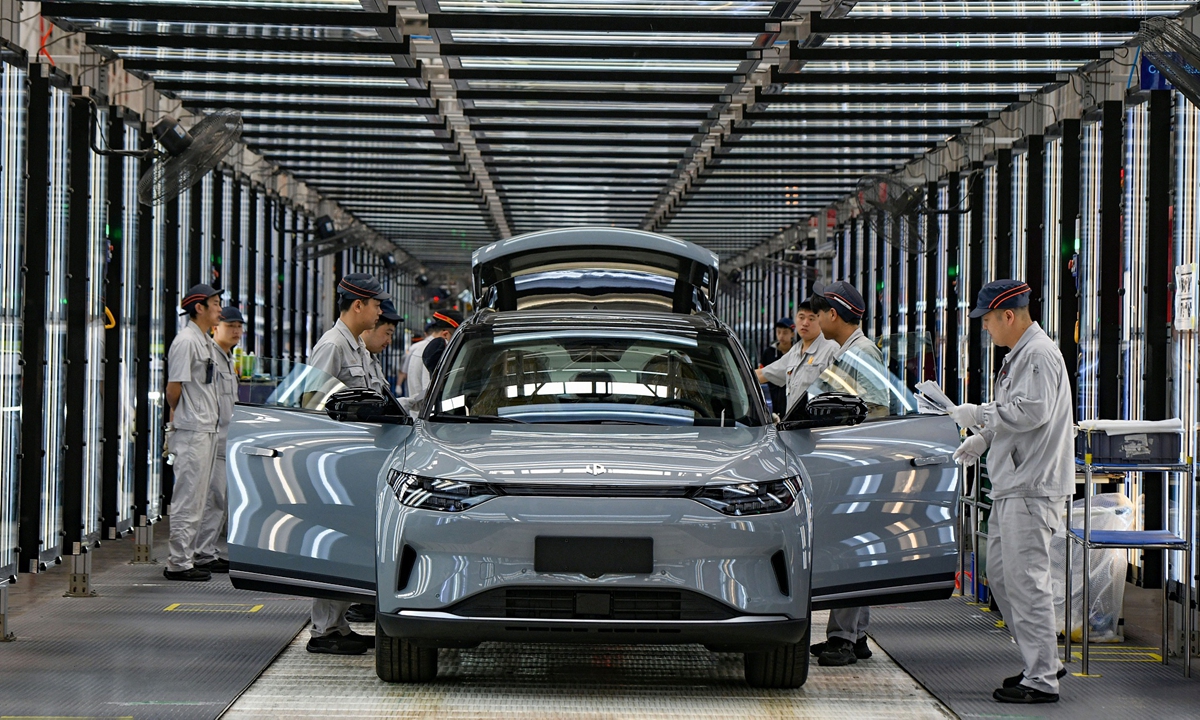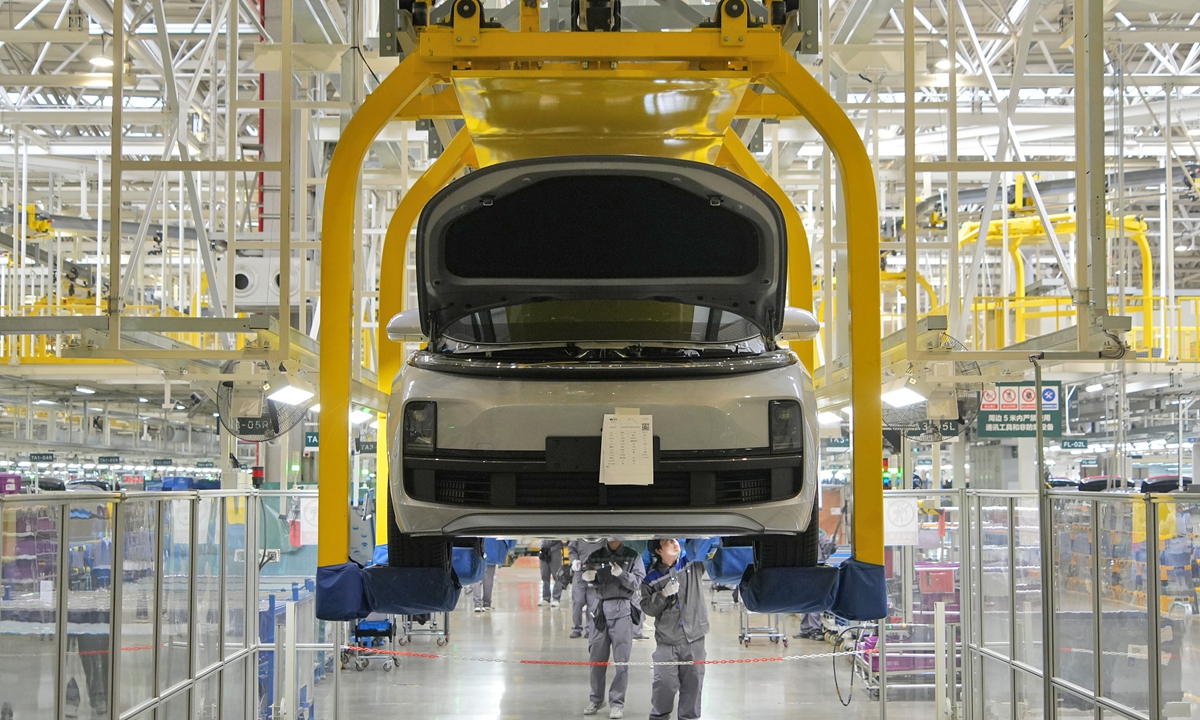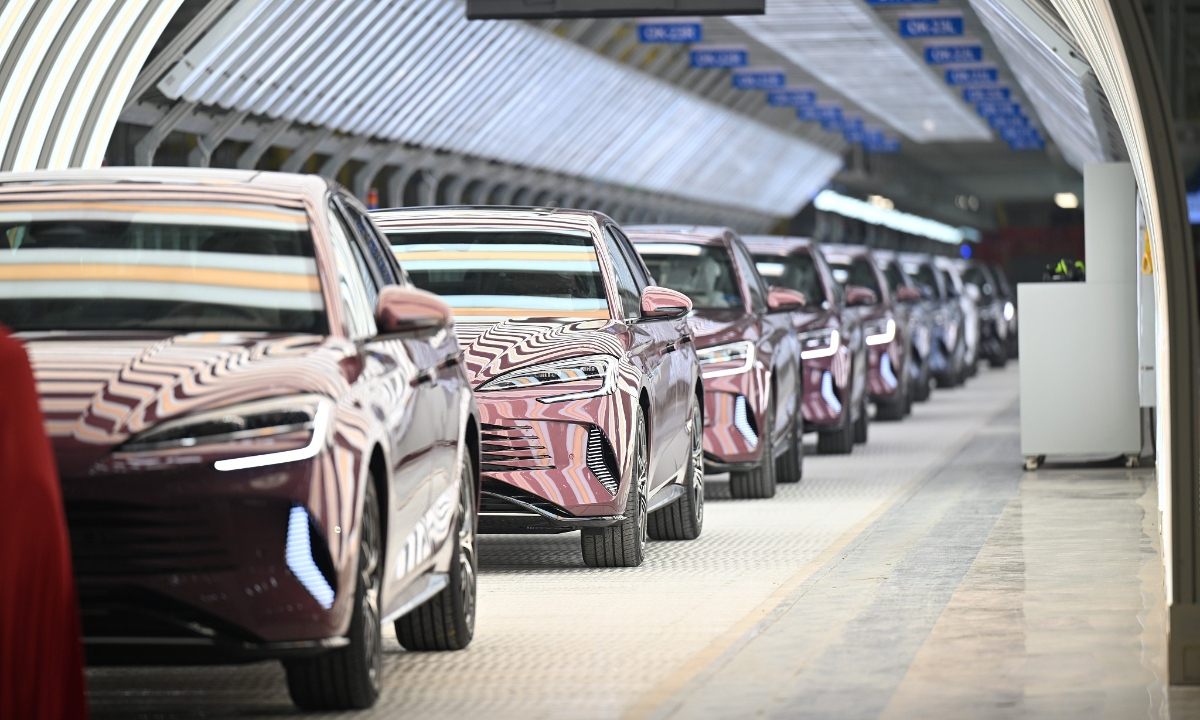EU fails to positively respond to core concerns of Chinese, EU industries: MOFCOM
Germany’s Scholz criticizes EC’s tariffs, calls for agreement

Workers complete assembling an electric vehicle (EV) at China's EV start-up Leapmotor in Jinhua, East China's Zhejiang Province on April 1, 2024. The smart EV factory delivered 14,567 new vehicles in March, a yearly increase of 136 percent. Photo: VCG
China's Ministry of Commerce (MOFCOM) said on Thursday that there remain major differences between China and the EU side in the negotiations over the dispute in electric vehicles (EVs) as the EU failed to positively respond to core concerns of Chinese and EU industries. Still, China has invited EU side for a new round of face-to-face consultations, the ministry said.
Meanwhile, as recent talks have so far failed to yield a mutually acceptable deal, there has been growing criticism against the European Commission (EC), the EU's executive branch that spearheaded the whole dispute. On Wednesday, German Chancellor Olaf Scholz reportedly criticized the EC's decision and called for an agreement with China, while also pointing to skepticism from other EU members toward the EC's tariffs.
While EU leaders have publicly stated a commitment to negotiations, the EU side has not demonstrated sufficient sincerity during the actual talks, sources have told the Global Times. Amid the growing criticism, including those from within the EU, the EU side should show sincerity and earnestly work with China to reach a mutually acceptable deal, experts said.
Major differences
Responding to a question about the progress of China-EU EV negotiations at a press conference on Thursday, He Yadong, a spokesperson for MOFCOM, said that China has so far shown the greatest sincerity and flexibility and the two sides have made important progress in some areas.
"However, because the EU side has never positively responded to issues related to the core concerns of Chinese and EU industries, there are still major differences in the consultations," He said.
Highlighting China's sincerity in resolving the dispute through friendly talks, the MOFCOM spokesperson said that China has formally invited the EU technical team to China to continue the next phase of face-to-face consultations as soon as possible. "We have made all preparations for this and are waiting for a reply from the EU side," He said.
In addition, when asked about whether China is considering increasing tariffs on imported cars with large-displacement engines, He said that "China is studying measures such as increasing tariffs on imported vehicles with large-displacement fuel vehicles and will make a prudent decision after comprehensively considering all factors."
MOFCOM has taken several steps in studying the potential tariff hike on large-engine cars, including meeting with automakers in August to solicit opinions and suggestions. If tariffs on large-engine cars are hiked, it will have a major impact on auto imports from the EU, a Chinese auto industry insider told the Global Times in May, when calling for such a tariff hike.
The EC's plan to impose hefty additional tariffs on Chinese EVs has sparked widespread concerns among Chinese and EU industries, as such a move would not only undermine the EV trade but also the broader China-EU cooperation. In particular, such concerns are growing in some EU member states such as Germany, which has a massive auto industry that has a huge presence in the Chinese market.
Such concerns were on vivid display on Wednesday, when Scholz, during a speech to parliament, criticized the EU's decision to impose tariffs on Chinese-made electric cars, saying 17 other states were skeptical as well as all the executives of carmakers with whom he had spoken, according to Reuters. "My request is that we come to an agreement between China and the European Union," he said.
Zhao Junjie, a research fellow at the Chinese Academy of Social Sciences' Institute of European Studies, said that the German Chancellor's remarks are very important and representative of deep concerns among some EU member states and industries over the EC's protectionist tariffs.
"Generally speaking, there is internal division within the EU, which led to the reluctance of the EC's decision-making," Zhao told the Global Times on Thursday, noting that while some countries like Germany take a practical approach and seek to stabilize China-EU cooperation, others support the protectionist move.
Sincerity needed
Such reluctance is also reflected in the EC's approach toward the negotiations. EC leaders, including President Ursula von der Leyen, have publicly said that they will continue negotiations with China, however, the EU side has not shown sufficient sincerity in the actual talks.
By making unreasonable demands, not responding positively to sensible offers from the Chinese side and attempting to split up Chinese electric vehicle (EV) producers in negotiations, the EU side has not demonstrated sufficient sincerity and resorted to tactics that may have undermined the talks, multiple sources close to the matter told the Global Times on Wednesday.
Among the examples of the EU side's lack of sufficient sincerity in the talks is its attempt to conduct separate negotiations with different Chinese EV makers on price commitment, even though the firms have already authorized the China Chamber of Commerce for Import and Export of Machinery and Electric Products (CCCME) as their representative in the negotiations, the CCCME said in a statement on Wednesday night.
"The EC's separate negotiations on price commitments with individual firms will shake the foundation and mutual trust for the negotiations and cause disruption to the negotiations between the two sides," the CCCME said in the statement, noting that such separate negotiations will divert resources and delay the negotiations processes.
The CCCME urged the EU to show its greatest sincerity and conduct further consultations with the goal of reaching consensus on price commitment, in order to reach a mutually acceptable solution as soon as possible. It also vowed to continue to do its best in the price commitment negotiations and effectively safeguard the interests of industry enterprises.
Jian Junbo, a deputy director of the Center for China-Europe Relations at Fudan University's Institute of International Studies, said that the EC's insincere tactics during the negotiations not only showed its lack of sufficient sincerity but also the politically-motivated protectionist nature of the tariffs against Chinese EVs.
"The EC's imposition of tariffs on Chinese EVs is a protectionist action with an obvious political characteristic, which could lead to multiple layers of negative consequences," Jian told the Global Times on Thursday, noting that this also explains the EC's lack of sufficient sincerity in the negotiations.
The EC is continuing negotiations, while at the same time seeking to undermine the negotiation process by conducting separate negotiations with EV makers, Jian said. "This shows it has no organization in the negotiations, and this problem must be addressed," he said.



